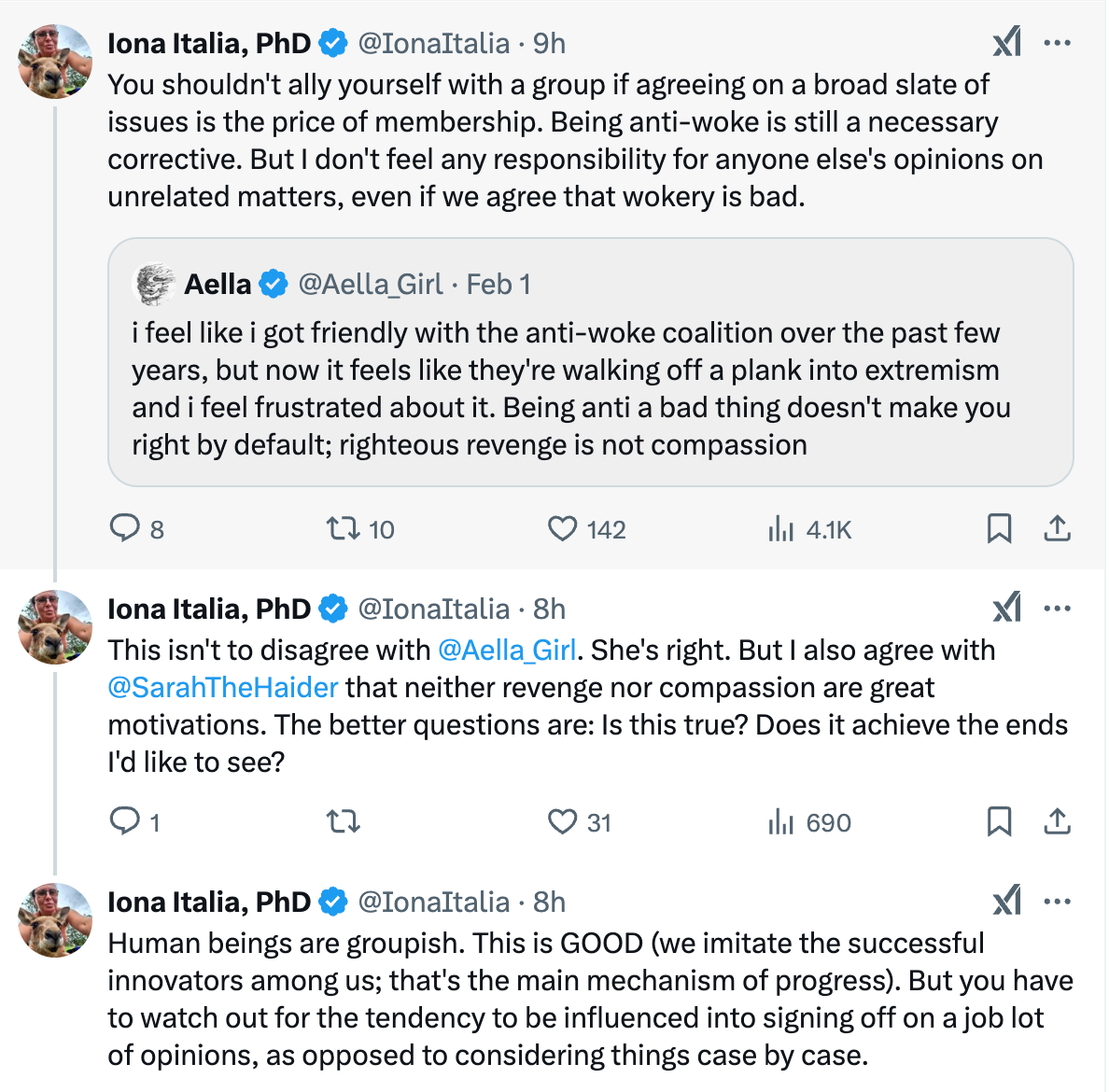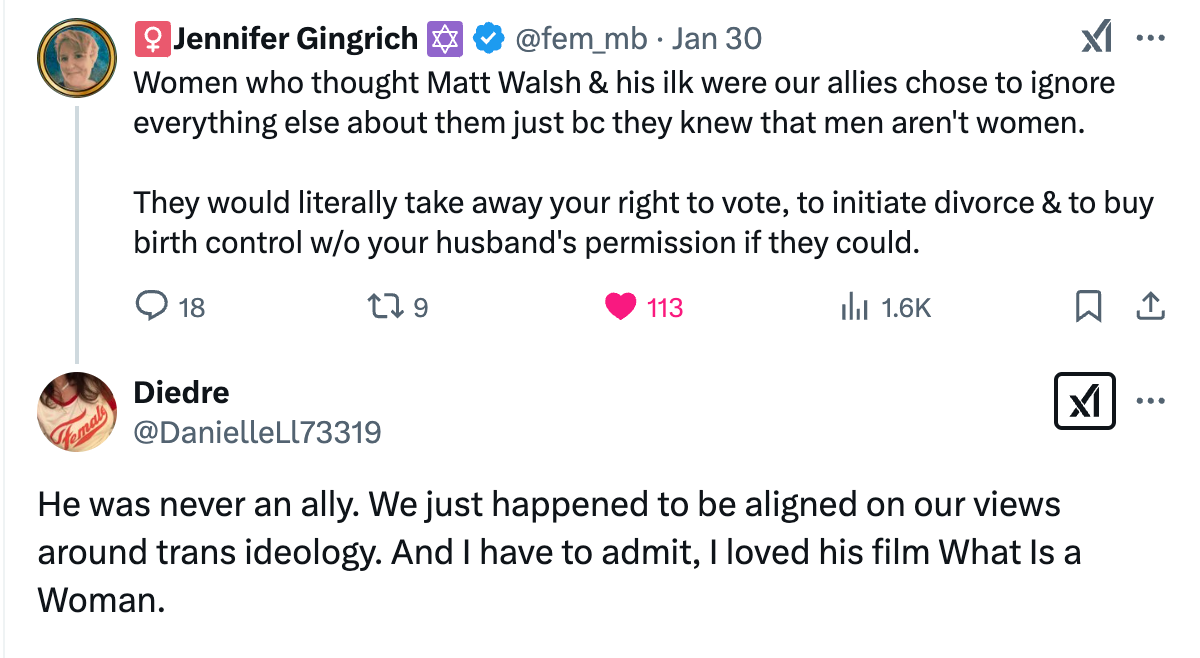
(Audio version here)
This is a question we are seeing increasingly from broadly liberally-minded people at the moment. It seems that many people who recognised the extremism, authoritarianism and irrationalism of the Critical Social Justice (woke) movement and supported those of us who criticised it on those grounds are currently feeling quite disillusioned. This is because there are a significant number of people ranging from politicians to political pundits to various kinds of public figures to large social media accounts to general members of the public who are active on social media who have become extreme and authoritarian and vengeful themselves in the name of anti-wokeness. It’s ugly and illiberal and concerns about it are often raised like this:
I think there are two issues of importance for liberals who are critical of wokeness because they are critical of authoritarianism, extremism and irrational, unevidenced ideological bias consistently to consider here.
The first is that is there is a tendency to think of the ‘anti-woke’ as a unified movement with shared ultimate aims when we are not. People oppose wokeness for a range of reasons and from a range of positions and always have. The fact that some of those reasons are illiberal and some of those positions are extreme should not cause liberals who care about what is true to feel they should dismiss all opponents of wokeness. Instead they should be selective about which critics of wokeness they support, holding in mind their wider anti-authoritarian principles and their pro-evidence and reason epistemology. I shall address this today.
The second issue is that there really is an illiberal anti-woke backlash going on and that it must be opposed by everybody who holds their liberal principles consistently, not only including but especially those of us who have been very vocal in our criticisms of wokeness. I will address this tomorrow and share a short excerpt from The Counterweight Handbook which discusses why it is so important not to let anger and resentment at the damage done by wokeness result in something that resembles a witch hunt. This will not only deny freedom of belief and speech but result in a lot of collateral damage to young people sucked into it and people bullied into complying with it and also cause the liberal anti-authoritarians to swing the other way and reignite sympathies for wokeism.
When Aella said,
I feel like i got friendly with the anti-woke coalition over the past few years, but now it feels like they're walking off a plank into extremism and I feel frustrated about it. Being anti a bad thing doesn't make you right by default; righteous revenge is not compassion.
She was expressing a common sentiment that we are hearing increasingly. Liberally-minded people who were concerned about authoritarian wokeness frequently found common cause with critics of it because they both opposed a bad thing. However, now that the tide is turning, the power of ‘woke’ is waning and the Trump administration is in power, a stark division is revealed between those who opposed wokeness primarily because it was authoritarian and being institutionalised and those who opposed it because it was the wrong kind of authoritarian and wanted to institutionalise something else. This may look like the ‘anti-woke coalition’ is walking off a plank into extremism. Although I think there is little doubt that some people have moved from a freedom-orientated position to a more radical ‘burn it all down’ position due to anger and resentment, the reality is that it was never really a coalition in the first place. Critics of wokeness have always included those who were liberal and freedom-orientated and those who were authoritarian. We are seeing more of the authoritarianism now because the anti-woke side is winning.
Iona Italia responded beautifully to this perception of “anti-woke” being a unified group rather than a position people can take while holding a variety of other positions and the problem of our tendency to be groupish and take on a cluster of opinions that do not necessarily go together.
I also addressed this in a 2022 piece, “Can We Please Try to Stop Politicising Incomparable Things in Clusters (and instead go with the best evidence available in each case). It seems the answer to that has been “No.”
People whose stance is 'anti' one particular thing are very seldom a united collective of people with shared values because people can oppose a certain thing from any number of positions. "The enemy of your enemy is not your friend" is a truism because it is true but I think our tendency to think groupishly can, nevertheless, often often make this hard to grasp intuitively.
The New Atheist movement provided a good example of this. Some members of it, including me, but more notably Sam Harris and Richard Dawkins, primarily opposed religion on the grounds that they did not believe it to be true and thought faith to be a poor epistemology that impeded knowledge production and the development of universal human rights. Others, most notably those who formed Atheism+, opposed religion (often exclusively Christianity) much less on the grounds of truth and much more on the grounds of Social Justice based on the premise that (in the US, particularly) Christianity was a dominant, majority religion that oppressed specific identity groups like women, and sexual and religious minorities. Of course, there is truth in that and this was also what the truth-focused atheists were concerned about in the realm of human rights, although liberal Christians absolutely exist! Nevertheless, the social justice faction broke from the truth faction largely because the latter included Islam in its criticisms of religion and because it was critical of identity politics and anti-scientific concepts of "gender."
We see a similar schism too in what is often referred to collectively as the 'gender critical' movement but is better understood, for our purposes here, as people who are opposed to the concept of gender identity and authoritarian trans activism. The biggest divide is between the genuine gender critical feminists who are continuous with the radical feminists and believe ‘gender’, including gender roles, gender stereotypes and gender identity to be an oppressive social construct that is used to oppress women and the gender conservatives who support gender roles and gender stereotypes but want to tie them more firmly to sex and enforce them more strongly and see gender identity as the most egregious impediment to that. This is absolutely not a movement but two groups with opposing beliefs who happen to coincide on being ‘anti’ one thing.
This all emphasises the importance of recognising what we ourselves and other people stand for and working together to achieve that rather than what we stand against.
The anti-woke are people who put significant amounts of time into criticising wokeness. We can understand wokeness at essence to be a belief that we all perpetuate systems of power and privilege like white supremacy, patriarchy, imperialism, hetero/cisnormativity, fatphobia and ableism due to having been socialised into those specific biases and expressing this in our assumptions and speech, particularly when it benefits our own group. However, it is believed that most people are not aware they are doing this. Therefore, the woke engage in authoritarian measures to control language, redress perceived imbalances using identity-based discrimination and compel people to affirm that they hold these specific biases and commit to dismantling them using the methods of Critical Social Justice. (More detail on this here).
To be anti-woke is to disagree with this worldview and think it is harmful and actively oppose it. People can do this from an extremely wide variety of positions. This can include evidence-based liberals like me who oppose it because the evidence does not support its claims or its remedies and because it is authoritarian, but it can also include Christian nationalists who want to impose their own faith-based beliefs on everybody using authoritarian measures. It can include black intellectuals who seek to address issues of racism and think critical theories of race do a bad job of explaining or remedying that but also white supremacists who think racism is a good thing and wokeness stands in the way of them doing more of it. It can include Marxists who believe that all this focus on identity is a neoliberal attempt to divide the working class and prevent them from organising to overthrow capitalism, but also free-market libertarians who oppose the authoritarianism and believe that prejudice is best addressed by less governmental and institutional interference and letting people come together in meritocratic competition. The anti-woke can include mainstream conservatives, the “Old Left” (social democrats), feminists, social or religious conservatives of all kinds, liberal LGB and/or T activists, globalists, nationalists, populists and more! The only thing all these groups have in common is that they perceive wokeness as contrary to their principles and goals and dedicate time to opposing it.
There has never been a time when it has been more important for us all to focus on what we stand for rather than what we stand against. The big divides right now are among those care about what is true and those who prefer emotionally resonant narratives that suit their agenda; those who want a society that protects individual liberty and to use that freedom of belief and speech to meaningly resolve conflict and those who want a society where their beliefs are imposed on everybody and dissent is squashed out of existence.
The anti-woke are not walking off a plank into extremism. Those of us who value individual freedom and care about what is true are still here and still opposing authoritarianism and evidence-free ideological narratives consistently. There is, however, a distinct rise of authoritarianism and evidence-free ideological narratives in the name of anti-wokeness. We, who have opposed wokeness, must face this head on and oppose it strongly and unambiguously. We are the ones in the strongest position to do so and be persuasive to any of the generally liberally-minded anti-woke in danger of sliding in that direction and to have the best chance of recalling those who already have. We need to do this, not because we want to protect wokeness, but because we do not want it to be replaced by another authoritarianism and because we do not want good and principled criticisms of wokeness to be undermined by bad and vengeful anti-wokeness and reignite sympathies for wokeness.
I shall expand on this tomorrow!






I once sort of unknowingly signed off on a “job lot” of opinions and positions.. I was in an intentional group that evolved/devolved in a direction that I realized (sort of out from under me so to speak) wasn’t about individual liberty and freedom, and revealed itself to be quite a load of group think and authoritarian in nature. I was the only one that left that group and to this day they maintain the position that I have to embrace certain beliefs in order to be “part of the community”…(I moved away).
Learning how to maintain my personal liberal values AND find belonging has proven elusive for me given my personal experience.
I think part of it is that such a large part of the conservative/Right establishment has come to define itself as anti-woke and must now, to perpetuate itself, find more and more things to call “woke”. It is ironic because I think the fight against racism morphed in the same way and needed to keep finding things to call “racist”.